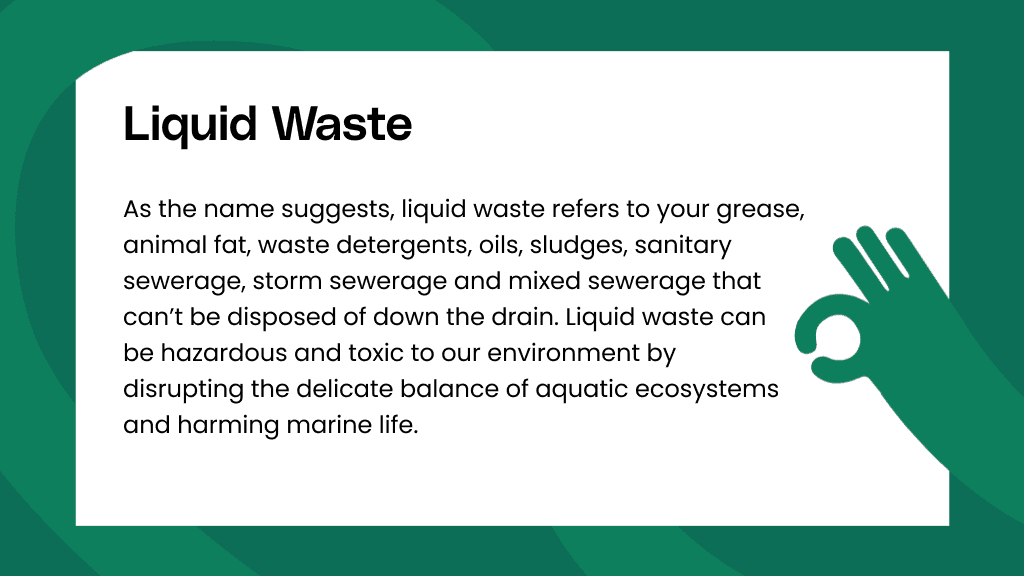Reclaim Waste for Beginners
Reclaim Waste for Beginners
Blog Article
What Does Reclaim Waste Do?
Table of ContentsNot known Incorrect Statements About Reclaim Waste The Reclaim Waste IdeasNot known Details About Reclaim Waste The Only Guide to Reclaim WasteReclaim Waste Fundamentals Explained
Residential sewage waste refers to the waste and items from a household septic container. The appropriate monitoring and disposal of residential sewer waste call for fluid waste to be moved to a sewer therapy plant where the correct approaches and tools are used to cleanse and dispose of waste.
Industrial waste typically includes prospective threats, such as flammable materials or a blend of liquid and solid waste products, and needs a more sophisticated and thorough disposal process. The disposal of industrial waste usually involves the filtering of waste before transport to make certain risk-free and appropriate disposal. Industrial waste is produced from byproducts and runoff of commercial processes and manufacturing.
This kind of waste can not utilize the very same sewage monitoring transport or procedures as septic or commercial fluids. The commercial waste monitoring process calls for the assessment and screening of fluid waste prior to it undergoes the disposal process (liquid waste disposal melbourne). Overflow waste is the fluid waste that originates from drainage and excess stormwater in very populated areas or cities
Overflow waste can trigger contamination and flooding if not managed appropriately. Making certain proper waste management can protect against calamities and reduce ecological injury.
Facts About Reclaim Waste Revealed
Call PROS Solutions today to learn more about our waste monitoring and disposal solutions and the correct ways to care for the fluid waste you create.
(https://hub.docker.com/u/reclaimwaste1?_gl=1*1980ev1*_ga*MTgwOTc3Nzc2OS4xNzMxMzI1Mzkw*_ga_XJWPQMJYHQ*MTczMTMyNTM5MC4xLjEuMTczMTMyNTcwOC4xMC4wLjA.)Do you know what occurs to your water when you disengage, purge the bathroom or drain pipes the washing device? No? Well, it deserves recognizing. This supposed 'wastewater' is not only a vital source but, after treatment, will be released to our land, waterways or the ocean. Utilized water from commodes, showers, bathrooms, kitchen sinks, washings and commercial processes is known as wastewater.

water used to cool down equipment or clean plant and equipment). Stormwater, a kind of wastewater, is runoff that streams from agricultural and urban locations such as roofs, parks, gardens, roads, paths and gutters right into stormwater drains pipes, after rainfall. Stormwater flows unattended directly to neighborhood creeks or rivers, eventually reaching the ocean.
A Biased View of Reclaim Waste
In Queensland, a lot of wastewater is dealt with at sewer therapy plants. Wastewater is moved from residential or industrial websites with a system of sewers and pump stations, recognized as sewage reticulation, to a sewer treatment plant. City governments develop, preserve and operate most sewage therapy plants. Operators are certified under the Environmental Management Act 1994 to discharge cured wastewater at an appropriate ecological requirement into rivers.
The Department of Natural Resources recommends city governments concerning managing, operating and maintaining sewerage systems and treatment plants. In unsewered areas, city governments might need homeowners to set up specific or house sewer therapy systems to deal with domestic wastewater from toilets, cooking areas, shower rooms and you can look here laundries. The Department of Natural Resources authorizes using home systems when they are verified to be efficient.
In some new class, treatment of some stormwater to get rid of trash, sand and gravel has started using gross contaminant catches. Wastewater therapy happens in four stages: Eliminates solid matter.
Wastewater then moves into huge containers where solids resolve and are gotten rid of as sludge. Oil and residue are skimmed from the surface area. Utilizes tiny living microorganisms called micro-organisms to break down and get rid of staying dissolved wastes and fine fragments. Micro-organisms and wastes are integrated in the sludge. Eliminates nitrogen and phosphorus nutrients that can cause algal blooms in our waterways and threaten marine life.
The 15-Second Trick For Reclaim Waste
Nutrient removal is not readily available whatsoever sewage therapy plants because it requires pricey specialized devices. It is coming to be a lot more usual in Queensland. Clear liquid effluent produced after treatment may still consist of disease-causing micro-organisms. If this effluent is launched into waterways such as rivers or the sea, the micro-organisms will ultimately die out.

This generally suggests wastewater has actually to be treated or pollutants removed prior to it can be discharged to waterways. Many wastewater streams right into the sewage system. Under the Act, neighborhood federal governments administer approvals and permits for environmentally relevant tasks (Periods) entailing wastewater releases that could have a neighborhood impact. The department provides authorizations and licences to Ages entailing wastewater launches that may have a local or statewide effect.
A Biased View of Reclaim Waste
Or else, samples are taken for research laboratory evaluation. Commonly many examinations are needed to develop the levels of each of the different toxins such as oils, hefty metals and pesticides in water. Surveillance supplies factual information concerning water quality and can confirm that licence problems are being satisfied. The information obtained through tracking offers the basis for making water quality decisions.
Report this page